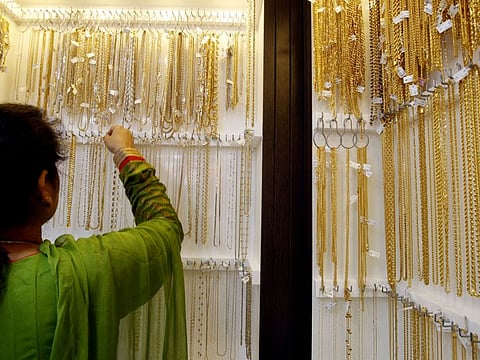Dubai’s elevation to ‘City of Gold’ status is as hard-earned as it comes
Dubai made best use of market circumstances even as others’ influence waned

In August, based on the success of the ‘Visions of Dubai’ gold coins, DMCC unveiled its 2022 edition UAE bullion coins, a continuation of the first and second, which were released in April 2012. Featuring His Highness Sheikh Khalifa bin Zayed Al Nahyan, the late President of the UAE, and Burj Khalifa, the second launched just eight months later, featuring His Highness Sheikh Mohammed bin Rashid Al Maktoum, Vice President and Prime Minister of the UAE and Ruler of Dubai, and the Palm Jumeirah on the reverse.
Each coin was minted by Emirates Gold DMCC and remain available in 1 oz, 0.50 oz, 0.25 oz and 1/10 oz denominations respectively.
In continuation, the third and fourth feature His Highness Sheikh Mohammed bin Zayed Al Nahyan, President of the UAE and Ruler of Abu Dhabi, with The Louvre Abu Dhabi on the reverse, and His Highness Sheikh Mohammed bin Rashid Al Maktoum and the Museum of the Future. As a collection of four, the most recent pair pay tribute to a nation and its leaders while remaining symbolic of the UAE's accomplishments in culture and the arts, as well as its very broadbased position as a centre for the gold industry.
Only City of Gold left?
I would suggest that Dubai may be the closest thing to a ‘City of Gold’ left in the world. As an expression that became widely used by 16th-century Spanish conquistadors, based on the often-mythical stories of long-lost cities with unimaginable wealth, the idea of a City of Gold isn't a new one, with Cíbola (today known as the Zuni-Cibola Complex, located in New Mexico), Quivira (suspected to be somewhere near modern-day Kansas) and El Dorado (based on folklore) among the most well-known.
As a precious metal with a long history of value, either as a commodity or as a cultural ornament of power, particularly by the Mesoamerican civilizations of the Maya, Aztecs and Olmecs, Dubai not only stands alone as a city with no indigenous gold but as one that has earned its position due to several factors; namely addressing the challenges in the market, creating an easy-to-use environment, and the development of innovation and accountability to community before shareholders.
It is interesting to note that the UAE was founded in 1971, the same year President Nixon closed the gold window as a way to address the US’ mounting inflation issues – a somewhat ironic decision given the current economic environment. Certainly, one of the positives to come from this was the liberation of gold as an independent commodity whose value was solely dictated by supply and demand, resulting in a global opportunity, and none more so than for the UAE and its burgeoning hydrocarbon wealth.
Managing financial volatility
Aside from the city's long-standing Gold Souk, some of whose tenants continue to trade over 40 years later, Dubai's relatively recent arrival to the gold industry's international markets meant a lower financial exposure to the serious volatility that had plagued debt-heavy gold companies of the 2000s, whose aggressive M&A programs had led to losses exceeding $100 billion.
Certainly, while the price of gold has continued to serve well as a hedge and an industrial/tech commodity, the ongoing decline of resources and successive greenfield exploration failures have not only required the industry to adopt a more multi-pronged approach but carefully analyze how the industry can adopt new technology while understanding how to streamline existing supply chains.
Putting the market to one side, other challenges that have supported Dubai’s rapid success can also be partially placed on the shoulders of the institutional giants whose excessive greed led to a general lack of trust in the markets. Most recently illustrated by JP Morgan Chase & Co, whose precious metals and treasury security scandal led to a fine of more than $920 million, while a further 11 financial institutions including Bank of America, Barclays, Credit Suisse, Goldman Sachs and Morgan Stanley were fined over $710 million by the Commodity Futures Trading Commission (CFTC) for record-keeping and supervision failures, as well as widespread use of unapproved communication methods.
As a destination which made its name as a historic centre for trade as opposed to mining or refining, Dubai's leadership understood that in positioning itself as an attractive centre for business, its ecosystem had the potential to support the gold industry's physical and trading future, particularly by utilising location to its advantage.
More importantly, its ability to reinvest with greater agility than its competitors. As such, Dubai is often widely cited as a city that has risen through the ranks to become one of the world’s most desirable cities for both expats and tourists. However, few people stop to think why.
I believe the decisions to reinvest in infrastructure while listening to the evolving demands of the global economy remain two of its most vital, thereby creating a safe, secure destination where businesses and individuals can thrive without facing the social disorder being witnessed in many other parts of the world.
This is part one of a two part series.
Sign up for the Daily Briefing
Get the latest news and updates straight to your inbox




